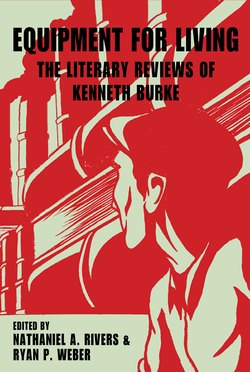Читать книгу Equipment for Living - Kenneth Burke - Страница 13
На сайте Литреса книга снята с продажи.
ОглавлениеDeft Plaintiveness
One Season Shattered by James Daly. Centaur Press.
Poetry, August 1936, 282–285
There were several aphorisms, printed and framed, in a room I remember from childhood. One said: “If whiskey interferes with your business, give up your business” (it was evidently an ironic plea for temperance, but I was bewildered because, taking it seriously, I couldn’t make sense of it). There was another about talkative mothers-in-law. A third, the one that bears particularly upon our present purposes, ran as follows: “Laugh and the world laughs with you—weep and you weep alone.”
When reading Daly’s lovely poems, in his recent volume One Season Shattered, I was made to remember this room and my moods as I used to shop about in it, examining its lore. For all their technical maturity, the poems made me recall almost fearfully the sense of uneasiness I experienced there. In some vague way, when in that room, I wept, and wept alone. So do these verses. Religiosity is many things, but one of its important ingredients is what I might call the “socialization of loneliness.” The religious man, said Nietzsche, thinks only of himself. But to think of oneself, in this real world, is to think of ways that will assemble those like oneself, to seek one’s band. Thus, the utterance is at once monologue and universal summons.
In Daly, the two terms of our formula are present. Emphasize the first term, socialization, and you get to his profoundly plaintive plea for Communism, “Storm Warning.” “Economics” means “housekeeping.” And the poet, always close to origins, spontaneously feels again the correctness of the metaphor, and calls for a house fit to live in, a house that will withstand the inclement weathers of history. Yet emphasize the second term, loneliness, and you come upon a severe sense of personal property, imaginings of a realm “Outside the Earth”:
a portaled world
To inhabit vastly and possess alone.
Poetry being a selection, it is not always certain how much or how little of one’s practical self one ropes off to form the personality of the poetic self. The happiest men, doubtless, are those in whom the practical self and the poetic self can be identical. But there is restlessness in those who, as poets, build an imperium in imperio. Daly seems to be of this latter sort. He maintains in his art a plaintiveness that does not wholly encompass the adult world. It is basically childlike. But this childlike quality, when rienforced by adult knowledge as with him, can exert a most penetrating appeal. I am a little afraid of it, since it does not equip us explicitly for battle.
Mann somewhere mentions “that sense of strangeness, which in an earlier age would have been called saintliness.” Since “saintliness” has been dropped from our working vocabulary, the “sense of strangeness” must bear its burden without the encouragement of the earlier euphemism. Daly is clearly one of Mann’s “outsiders”—and perhaps my love for Mann inevitably foretells my susceptibility to the modes of appeal in Daly. The subtlety of his rightness is like the subtlety in a right tone of voice: the critical, quantitative, conceptual words for defining it are not yet at hand.
But there are some points where the matter emerges for discussion. We can note, for instance, how the “outsider” attitude in his earlier poems attains its obvious symbolic equivalent in the nature of his titles: “He walks alone by a lake-shore; He asks an old question, new to him; He reads the Book of Job—and he pretends her death.” He looks upon the poetic I as he, with the outsider attitude, as though this articulate self were a mere tenant in the house of the inarticulate body. He goes to woman as across a bridge. He even spontaneously denies himself the solace of friendly personalizations: for when he turns to the thoughts of a father, he thinks in terms of defeated courage, and says with almost Greek severity:
See your heart’s proud city razed; and know
The destroyer was in some fierce way yourself,
An inward flaw, destruction in your soul.
And when he turns to thoughts of a mother (He mourns for his mother), we quickly get to the “moaning of the tide”—whereat we recall the first poem in his book, “He thinks of Life, the protean Eternal She,” and learn that life is an ocean in which the poet would drown himself. Thus are mother, life, infinity, and death inexorably brought together in the magical fusions of the “unconscious,” so that the cards are stacked in advance: there seems little likelihood of pulling a good time out of that setup.
In sum, what do we have? So far as this reviewer is concerned, we have a collection of poems that reawaken vividly the deepest of old responses. Their success within this frame comes from the tactfulness of complete sincerity. Their accent is as correct in the carrying-out of its purpose as are the gestures of a skilled actor. One feels arrested, one feels startled—an event which, in critical shorthand, we could signalize by saying simply that one feels a kind of beauty.
